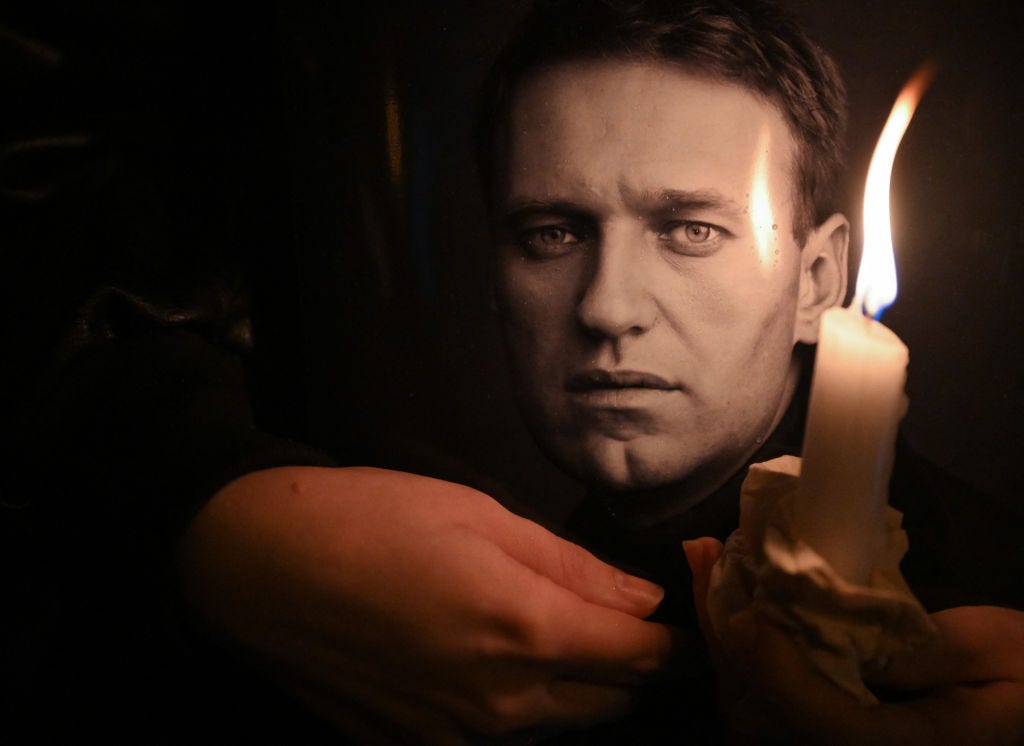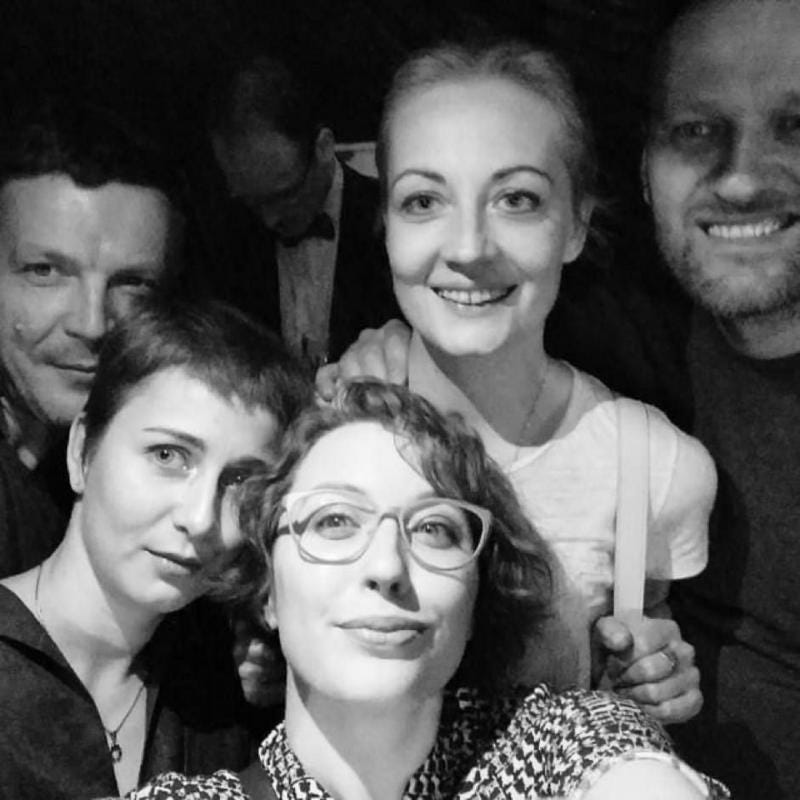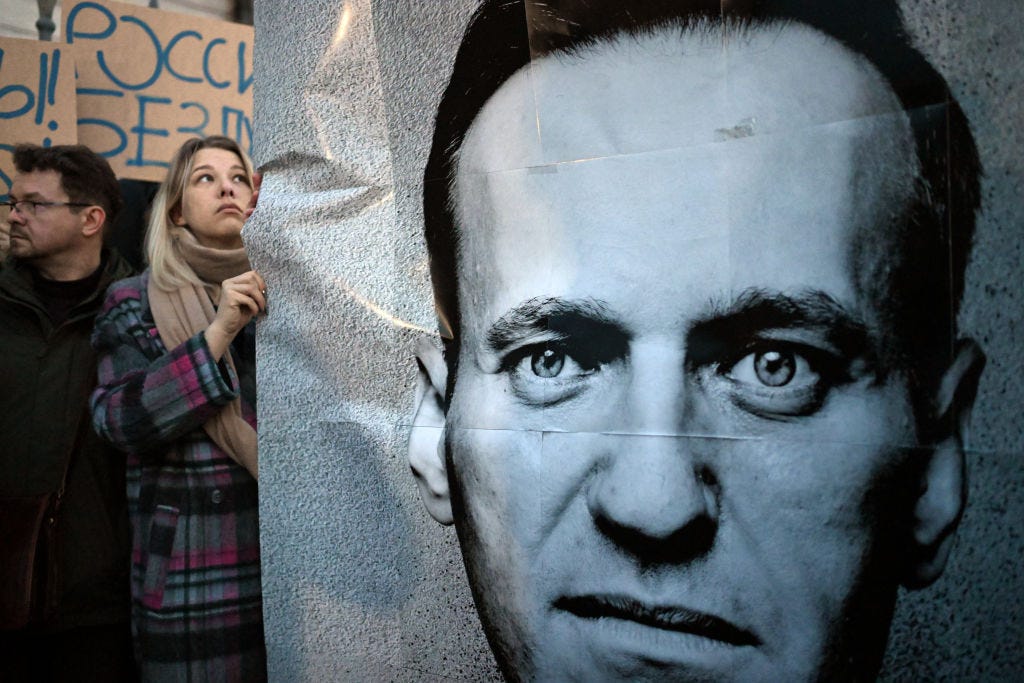Remembering Alexei Navalny
He had a remarkable ability to inspire hope, write BBC News Russian journalists who knew him.
For over 15 years Alexei Navalny was one of Russia’s most prominent personalities and politicians. During that time many BBC News Russian journalists got to know him well. They reflect here on an extraordinary life cut short and a moment of profound loss for his family, his friends and for Russia.
Andrey Kozenko: a unique person for our generation
In 2005, I had just moved from Saratov to Moscow, to start a job at ‘Kommersant’ newspaper. I felt quite intimidated and spent my time sitting in the corner, afraid of everyone. I was writing an article about a conflict between residents and developers in some obscure part of the city. "Maybe I should call an expert?" I asked timidly. "Go ahead and call," my colleagues replied. "There's this activist called Navalny, he's not afraid to speak his mind. Write down his phone number."
I encountered him again in 2007 leading a protest march and cheerfully facing down riot police who were intent on beating up and dispersing the demonstrators. That’s when I first realised that I was looking at someone different, a real politician, and a significant one too.
As the years went by, we often exchanged phone calls and messages on Twitter. I always felt that sense of great power in him. We were born the same year, but he was a unique person for our entire generation.
In December 2011, during the big protests calling for fair elections, my wife was at a Moscow court dropping off a parcel for a friend who had been arrested. Suddenly she caught sight of Navalny who had been detained at the same protest. "Hey leader, where do we go now?” she shouted. “Revolution Square or Bolotnaya Square?” It was the only question to ask in those days. "It doesn't matter," he shouted back. “Just make sure you get there."
The authorities went after Navalny relentlessly, instituting countless criminal and administrative cases against him. He became a master at delivering the defendants final statement to the court – I heard him do it at least a dozen times.
In the autumn of 2020 we met again in very different circumstances. It was at a hotel in Berlin where I was waiting for him to give his first interview to the BBC after surviving a nerve-agent poisoning. He came into the lobby looking tall and gaunt, and we hugged for the first time in our lives.
On January 17, 2021, he flew back to Moscow from Berlin. I was one of the many journalists on the plane. He asked us not to bother him during the flight, and he sat next to his wife Yulia, watching South Park cartoons. He was detained on arrival in Moscow. It was the last time I ever saw him.
All my tears today are for you Alexei, and for your family, who for the past few years have had to watch in real time as they’ve tried to kill you, and to drive you to your death.
Ilya Barabanov: a remarkable ability to inspire hope
I first met Alexei Navalny in 2005. It was not long after the popular revolutions in Georgia and Ukraine, and young Russians were suddenly becoming interested in politics.
At that time, a young Navalny, and an even younger Ilya Yashin (also now in jail for his political activities) shared a desk in a small back room in the basement offices of the opposition Yabloko party, on Moscow’s Pyatnitskaya St.
Yevgenia Albats, the journalist, and later chief editor of The New Times magazine, used to gather young politicians at her apartment, to hear talks about international relations and political science, by well-known politicians and academics like the former chess champion Garry Kasparov and the economist Sergei Guriev.
When I started working at New Times, I was also invited and we all became close friends. Late one Friday evening, after signing off another issue of the magazine to print, a small group of us went for dinner and for the first time Navalny told us about his idea to set up an anti-corruption project. None of us had any idea back then just how much success and popularity this project would bring him.
Russians are accustomed to officials speaking to them in often incomprehensible official jargon. Navalny was the first to speak to voters in simple and humorous language. He made jokes about himself, the authorities, friends, and colleagues. It wаs not something that usually happened in Russian politics, and it’s hard right now to imagine it happening again any time soon.
Lots of things were to come: studies at Yale University, the creation of his Anti-Corruption Foundation (FBK, which was designated by the Kremlin an extremist organisation), numerous police searches and arrests, and a campaign to become mayor of Moscow (he came second, behind Sergey Sobyanin, Putin’s candidate), an achievement which now serves as a model for all opposition politicians. Then there were the clearly politically motivated prosecutions.
I remember long evenings on the train travelling back to Moscow reporting one of his trials which was being held in another city. Navalny kept making jokes about the judge, who actually seemed to quite like him. It didn’t stop him giving Navalny his first jail term, which was then swiftly commuted to a suspended sentence.
Today, I've lost a friend whom I've known for almost 20 years, and millions of people in Russia have lost hope for a better future. Navalny's ability to inspire hope, even when he was in a distant prison colony, was remarkable. And it's hard to believe that we'll never again hear his signature phrase: "Hi, this is Navalny."
Elizaveta Fokht: he was more worried about Russia than about himself
When I started working for the BBC in 2017, I used to see Navalny all the time. There were rallies, opposition meetings, and then the endless trials for criminal and administrative cases – too many to count. I remember filming him one time with my phone in a holder that looked like a steering wheel from a race car. I still have the video of the moment where Navalny notices this strange device and starts laughing out loud and pointing at the camera.
Navalny's sense of humour is something we will all miss. He knew how to respond with irony to any event in the world – including his poisoning with a nerve agent. He joked about himself, his allies, and his political opponents. Another memory: after his return to Russia, during another trial (I think it was a hearing about him allegedly insulting a war veteran), I covered it together with my husband, a journalist for the Financial Times. When we came into the courtroom together, Navalny laughed: "You've picked quite the place for a date, guys!"

Navalny's relationship with journalists is indeed a topic for a separate conversation. Journalists were often accused of treating him not as a news maker, but as a friend. Navalny in turn was accused of being too harsh on journalists and often criticizing them. Perhaps such accusations were inevitable. Primarily because there hasn't been a politician in Russia who has attracted so much attention in at least 15 years.
Today, I’m thinking a lot about our last meeting. It happened on February 21, 2022. At that time, Navalny was on trial again for allegedly stealing campaign donations, but the court hearing was taking place in the IK-2 prison colony in Vladimir region, where he was already serving his sentence. Right in the middle of the hearing, which we journalists were watching via video link in a separate room, Vladimir Putin began his now infamous Security Council meeting, convened prior to the announcement he was invading Ukraine.
Later in the evening, during a break, there was a chance to go and sit in the actual room where the hearing was taking place. I surrendered my phone and passport and went to stand in the corridor to wait for the session to resume. Also waiting in the corridor were Navalny in his prison uniform, his lawyers and about 20 law enforcement officers – bailiffs, prison colony staff, some ‘important people’ from Moscow. Navalny caught sight of me. "Oh, Fokht, fancy meeting you. What are you doing here?" he joked, for all the world as if we had just accidentally bumped into each other on the street in Moscow.
Navalny wanted to know if we could all hear what he was saying over the video link in the press room. I told him we could hear him fine, but that the agenda of the hearing had been interrupted by the Security Council broadcast. "What happened there? Come on, tell me!" Navalny seemed to forget that he was on trial facing even more years in jail. I told him about the Security Council and the prison guards also listened in intently.
I think, this episode showed the essence of Navalny’s personality. The fate of the country, the fate of Russians, always concerned him more than his own fate. That is why he decided to return to Russia, having survived an assassination attempt on his life.
Natalia Zotova: “I am still writing letters to him. I can’t stop”
One day, I bumped into Navalny on the street. It was the summer of 2020, during the COVID pandemic, and I was riding a scooter along the Moscow River embankment, with nowhere particular to go.
Suddenly, I heard a joyful shout from the side: "Zotova!" Turning my scooter around, I expected to see a friend or a colleague, but standing on the sidewalk were Alexei Navalny and his wife Yulia, dressed in their running gear. As a journalist accustomed to chasing after speakers and struggling to reach them, I was pleasantly surprised that he noticed me, rather than the other way around.
We chatted for a few minutes and then went our separate ways. Afterwards, I often found myself reflecting on this seemingly insignificant encounter: it was one of the last days when everything seemed okay, compared to the future that awaited us.
The full-scale invasion of Ukraine had not yet started. I was still living in my hometown, and the thought of having to move to a foreign city in a couple of years hadn't crossed my mind. Navalny hadn't been poisoned with Novichok, he wasn't in a punishment prison cell, he was just jogging through a Moscow park.
And that was the last time I saw Alexei Navalny alive.
When Alexei was imprisoned, I started writing him letters. At first, through the Russian Post service, and then via email from abroad. I got used to mentally making notes: I need to tell Alexei about this news, he'll like it, I'll definitely mention this in the next letter.
I told him about learning Latvian (Alexei praised me a lot for this) and how I’d started to feed a seagull that kept landing on the windowsill of my Riga apartment. He jokingly suggested I should try to catch it and cook it for supper.
"Your letter passed the censors,” he wrote in the autumn of 2023. “None of the other letters this week did, but yours did." By that time the prison authorities had stopped letters from his family reaching him. "This means that your letter doesn't contain plans for crimes like the others. What can I say to you? It's shameful to be like this. You're already an adult, but you're not planning anything criminal," he joked from the height of his last, gigantic, 19-year sentence.
In some corner of my brain I am still composing another letter to Alexei. I can't stop myself yet.
Andrey Goryanov: he gave his life to expose the system, so millions could see its true face
Alexei Navalny is dead. Not long ago, he was alive, smiling from one of the darkest places on earth - a colony beyond the Arctic Circle, cracking jokes, writing witty posts, giving his supporters the belief that dark times would pass and people in Russia would one day be able to live with dignity.
He helped millions to believe that light would come after darkness, and that today's Kremlin was the paroxysm of a terrible totalitarian system that was dying, and trying to drag everything living with it into the grave.
Alexei Navalny made himself into a politician despite the system. He became real and, perhaps, the only public politician in Russia who could call things by their names: theft was theft, crooks were crooks. He found and publicly presented evidence to support his words.
Alexei was the complete antithesis of the politicians sitting in the Kremlin. He did not obey orders, he was not afraid of threats, he acted according to his ethical principles, and he took responsibility for his words.
His journey from Live Journal anti-corruption investigator, to Russia’s most prominent opposition politician, took 15 years.
Thanks to his talent, knowledge, and perseverance, he managed to investigate and explain how Russia became a country of such deep social divisions and inequality, he presented the proof of how the super-rich and the ‘siloviki’ (security services) were keeping he country in poverty.
"Corruption in Russia has penetrated all spheres of life,” he said. “Corruption is not an abstraction. It literally gets into the pocket of each of us."
In doing this he was attacking the very foundations of the system. The Kremlin felt threatened. A source told me how during the Moscow mayoral elections in 2013, FSB agents searched for compromising material on him for a very long time but couldn't find anything. And then they said, "Actually this Navalny seems to be a decent guy. Maybe we need someone like him, I'll go vote for him now." This was probably the first ‘real’ sentence for Alexei.
The Kremlin does not forgive when people from inside the system start to pivot their sympathies towards ‘normal’ people.
Now Alexei is dead, and one way or another it was the system that killed him.
Alexei's life is a rare example in Russia of a citizen and politician who managed to believe in himself and convince a huge number of people that Russia is created for the people who live there, not for a system of oppression, as symbolized by the Kremlin.
Alexei was a public politician who was able to articulate his political position, follow it, sacrifice his freedom, and ultimately his life for it.
He gave his life to expose the system so that millions could see its true face.
It will be up to others now to continue that fight.
BBC is blocked in Russia. We’ve attached the story in Russian as a pdf file for readers there.
Read the full story in Russian here.
English version edited by Jenny Norton.








